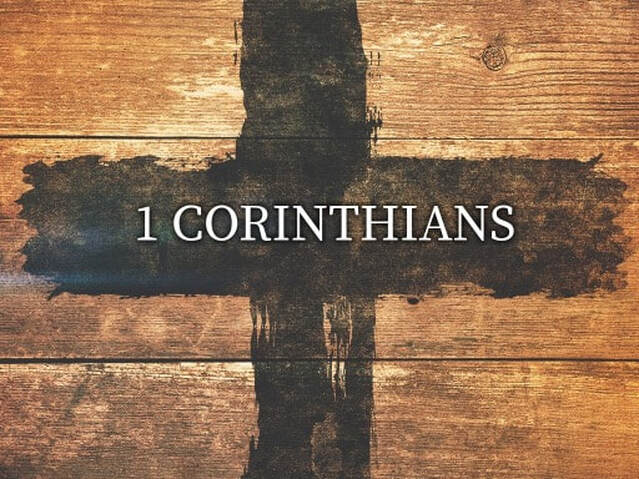In this summer study, we read through Paul’s First Epistle to the Corinthians. This is a church overcome by division and located in the most licentious city in the Roman world. Out of this conflict, Paul writes this pastoral letter addressing dissension, lawsuits, idolatry, sex, church organization, and proper worship all of which can be resolved through love. As background for this study, I am using N.T. Wright’s commentary Paul for Everyone and William Barclay’s The Letters to the Corinthians. This summer study is for twelve weeks. (One week of emails is missing.)
(Summer 2014)
1 Corinthians – Introduction
No Comments
Out of this conflict, Paul writes this pastoral letter addressing dissension in the church, lawsuits between believers, sex, and idolatry. This letter also provides us with a basic outline of our liturgy.
1 Corinthians 1-2, pt.1
No Comments
In 1 Corinthians, Paul isn’t writing to us, but to a very specific church with very specific problems. Within this letter, we are listening to one side of a conversation between two intimate parties.
1 Corinthians 1-2, pt.2
No Comments
In this chapter, Paul confronts the division of leadership within the congregation. Paul instructs the his audience that the means to overcome these divisions is finding our unity in the power of Christ crucified.
1 Corinthians 3-4, pt.1
No Comments
One way to read the Bible is to allow the Spirit to speak to us today through our Scripture readings thereby giving life to those readings. Under the Lecto Divina method we are to Read, Meditate, Pray, and Reuminate on the lesson, allowing the Spirit to speak.
1 Corinthians 3-4, pt.2
No Comments
We are the Temple where God’s Spirit dwells, and where the true worship of him occurs.
1 Corinthians 5:1-6:11, pt.1
No Comments
This week we are reading about sex and lawsuits.
1 Corinthians 5:1-6:11, pt.2
No Comments
Although this reading is generally concerned with sex, that is not the only ground given by Paul to expel a member of the congregation.
1 Corinthians 6:12-7:40, pt.1
No Comments
In the readings, Paul sets forth the ideal about sex and marriage, but makes a practical exception to his ideal of celibacy by holding up marriage as the appropriate vehicle to control and direct sexuality.
1 Corinthians 6:12-7:40, pt.2
No Comments
In chapter 7, Paul presents sex as the outward and physical means of the renewal of the marriage covenant and the celebration of the self-emptying that should occur between spouses.
1 Corinthians 8-9
No Comments
A person’s insistence that their interpretation of Scripture is the “correct one” stems not from “vision but from vanity” and love of themselves and not of God. True humility and charity requires we be able to equally love someone else’s true opinion of the Scriptures. Augustine – On Christian Doctrine
1 Corinthians 10, pt.1
No Comments
Here, Paul speaks of the cloud (Holy Spirit), the sea (baptism), and the food and drink (Eucharist) that those in the Exodus experienced just as the Church now experiences their fulfillment.
1 Corinthians 10, pt.2
No Comments
Although Augustine says we should be open to alternative interpretations of Scripture, one of the rules he lays down is that the Scriptures should not be given a nonsensical interpretation that contradicts our reason and observations of the natural world.
1 Corinthians 11, pt.1
No Comments
The allevation of women having to cover their heads in church raises two questions: 1) upon what grounds does the church have the authority to dispense with a clear biblical directive (there are a lot more directives the church has let go of in the last century) and 2) what is the underlying principle of Paul’s directive and how do we continue to carry out that instruction today.
1 Corinthians 11, pt.2
No Comments
Within his struggle with scriptural interpretation, Augustine concludes his discussion with the idea that all of Scripture and any reading we would give to a particular passage must be ordered by the two great precepts of love of God and love of neighbor “for otherwise we make God a liar.”
1 Corinthians 12, pt.1
No Comments
As you read through this chapter notice the different lists of gifts that Paul sets forth and the fact that 1) everyone has a gift, and 2) no one has all the gifts.
1 Corinthians 12, pt.2
No Comments
Like Plato’s Republic, within this chapter, Paul is providing us with a different type of community with Jesus as Lord and each of us performing a specific function or office within this new unified undivided community.
1 Corinthians 13, pt.1
No Comments
Since Jesus commands us to love our enemies, how must be apply the love described in verses 4-7 to that person?
1 Corinthians 13, pt.2
1 Comment
Beginnning in Chapter 11, Paul argues that divisions are overcome by discerning the body of Christ within the Eucharist and the Church. In this way, we realize that divisions are not based upon Christ but secondary issues. We make this discovery through the recognition of the primacy of love in Chapter 13.
1 Corinthians 14, pt.1
No Comments
The overall principle that Paul desires is a mature, edifying, decent, and orderly worship.
1 Corinthians 14, pt.2
No Comments
These verses, at least in the modern context, challenge us in the use of proof-texting Scripture. Taking a particular verse of Scripture in which to build a position can be dangerous.
1 Corinthians 15:29-16:24
No Comments
A surface reading of this verse leads to the interpretation that 1) members of the Corinthian congregation were being vicariously baptized for the benefit of those who had already died and 2) Paul has no objection to the practice.
The Spiritual Was More Substantial Than the Material for the Ancients
No Comments
David Bentley Hart’s discussion of Paul’s distinction between the σῶμα ψυχικόν (psychical body) and the σῶμα πνευματικόν (spiritual body) in 1 Corinthians 15:35-54.


